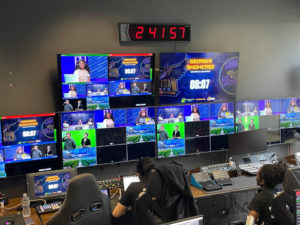Universities and gaming have always had an uneasy, if not outright adversarial, relationship. Many of the early PC gamers got their start at colleges and universities because universities were one of the earliest adopters of the internet and many people’s first exposure to a personal computer was in a university’s computer lab.
This relationship has created consternation for both institutions and parents since then, with institutions concerned that university resources are not being used for educational purposes, and parents worried that their children are spending their time gaming rather than learning. Collegiate esports has been a remarkable deviation from this trend.
Georgia State University began its esports program in 2017, as part of an experiment. It launched the Creative Media Industries Institute, a new organization in the College of Arts and Sciences designed to integrate training in technology, media, and the arts and prepare students for careers in film and TV, music production, and game development.
The inclusion of a purely competitive, extracurricular esports program was an oddity, but not an unreasonable one. Students interested in gaming might also be interested in game design, and vice-versa. This began an ongoing collaboration between the competitive and academic sides of gaming and esports at Georgia State that has only deepened and grown more fruitful with time.
One of the first fruits of that collaboration was PantherLAN. PantherLAN was Georgia State’s first university-sponsored esports tournament, and the first tournament of its kind in Georgia. We hold the tournament twice a year, once in the fall semester and once in the spring. It has showed us two things. First, that students wanted to compete. We had a huge number of teams from schools we never knew had esports clubs, eager for local collegiate competition. Second, students wanted to help. From the moment we announced the first event, we got messages from students interested in assisting with all aspects, from casting to game management. We realized quickly that while students interested in traditional media production have many avenues to gain experience, no one was providing those skills or experience to students interested in esports or non-traditional media. We also found significant demand for those skills – not only from game developers, but an entire esports ecosystem including developers, production companies like Skillshot Media, event organizers like Dreamhack and traditional content creators looking to branch out into streaming and other forms of new media creation.
PantherLAN became an opportunity not just for us to host competition, but also to engage students behind the scenes. Since then, PantherLAN has become more than 95% student run, with students in charge of casting, stream and technical production, and game management. The event has also enabled us to increase ties with local companies, bringing them in as sponsors and vendors and eventually setting up opportunities for student internships.
In 2020 the Georgia Film Academy, in partnership with Georgia State University and Skillshot Media, introduced its first class on esports. The curriculum was created jointly by GSU and the GFA, and the class was taught by Todd Harris, CEO of Skillshot. Its purpose was to introduce students to the business of esports and the ways in which esports events are created, produced, managed, and monetized. The final project was for students to create, host, and stream their own live esports competition.
Since then, the esports curriculum has expanded into a certification pathway with five courses, each focused on a specific area of esports content creation. The pathway culminates with student internship placements, partnering GSU students with local esports and gaming companies so that they can develop practical experience in the industry, something which is especially vital in a field that is so rapidly developing and changing. Despite the relative youth of the program, these internships have led directly to job offers for graduating and occasionally even current students.
Much of the focus and research on esports in academics has centered around two areas: the impact of gaming on student academic performance, and the ways in which gaming can be used as a teaching tool. While these are both valuable areas of discussion, the esports industry itself has been somewhat neglected. Some colleges and universities are beginning to offer majors or minors in esports management, but overall relatively little attention has been paid to preparing interested students for careers in esports. With industry revenues topping $1 billion in 2020, and growth projected to reach $3.5 billion by 2027, esports is expanding dramatically. This growth is an opportunity – for students, to pursue careers in a field that they are passionate about, and for colleges, the opportunity to provide students with the training and experience they need to succeed in those careers.
Many students, even avid esports followers, are not aware of what career options exist in esports and the lack of clear programs of study can make it difficult to develop skills or even know what skills are valuable. NASEF is working to help students see the big career picture while in high school. In college, a hybrid approach like those used by more traditional film and television departments, combining classroom learning with internship opportunities and hands-on practice is effective both in developing students’ skills and in creating the industry connections which are so helpful in finding employment for graduates.
Colleges and universities have an important opportunity to make connections and provide skills training and practical experience in the esports industry. It’s an opportunity we should take.
